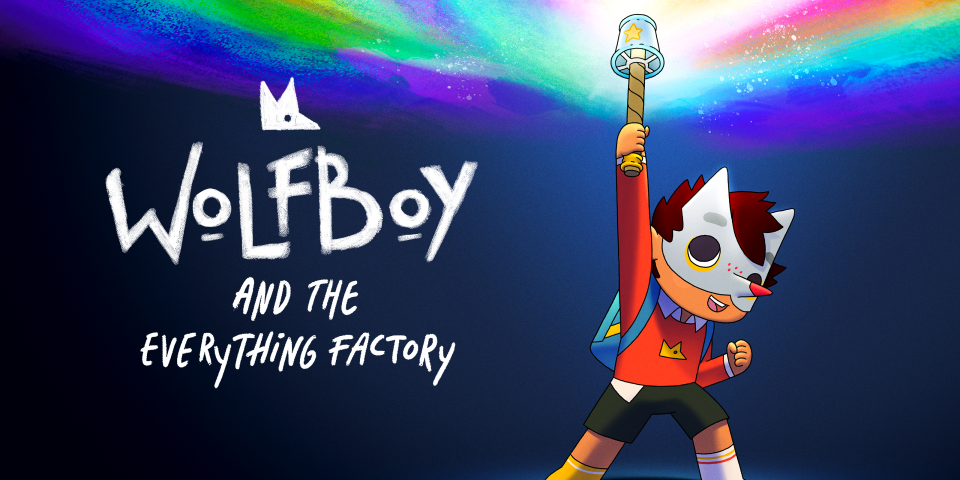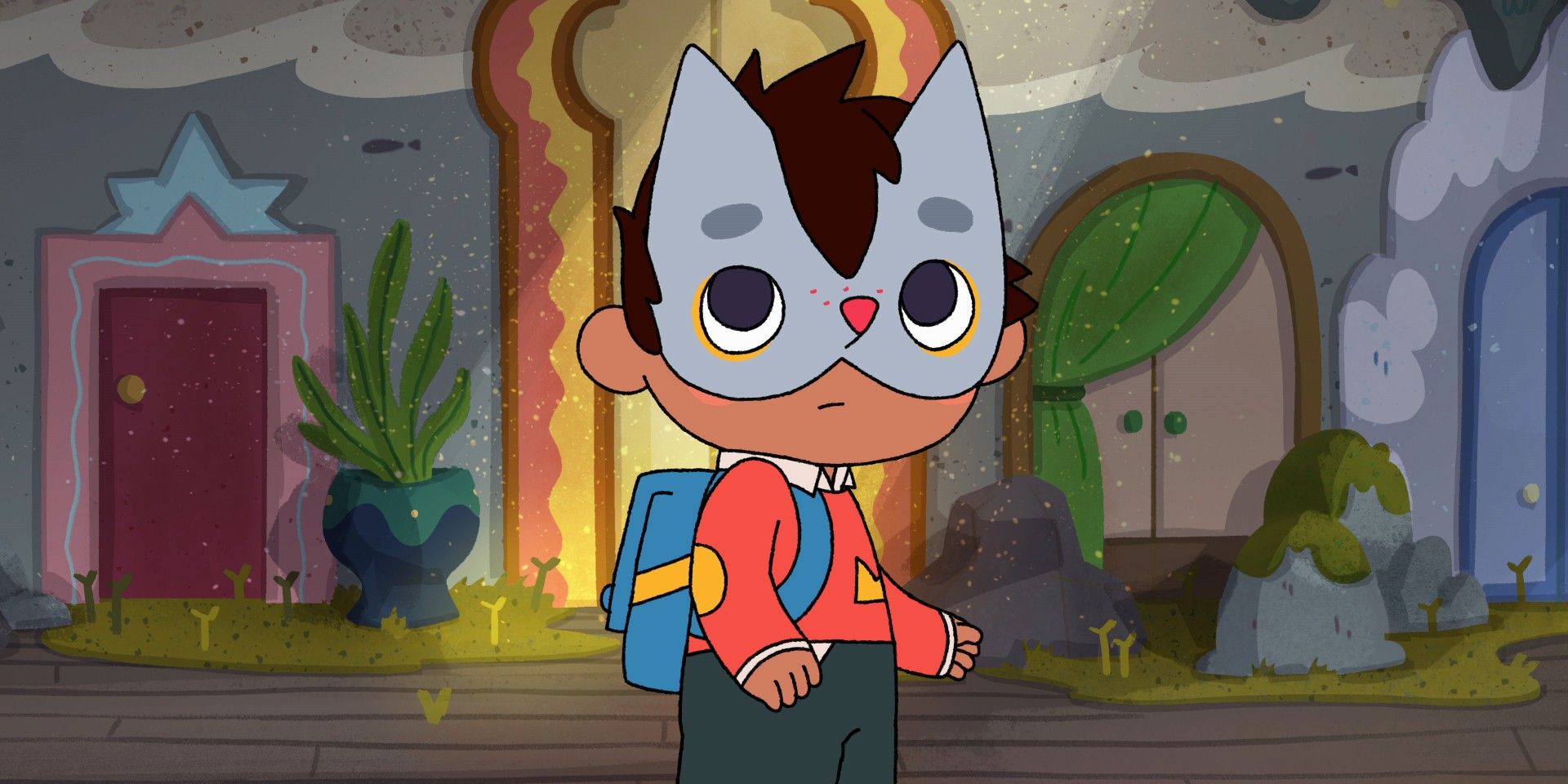One of the freshest and most imaginative original children’s programs on Apple TV+ is Wolfboy and the Everything Factory. Created by Toff Mazery and Edward Jesse, the animated series has returned for its second season as Wolfboy and his friends continue to let their dreams come to life in the fantasy world of sprytes and other curious creatures. Executive produced by Joseph Gordon-Levitt through his collaborative production collective company HitRecord, with Gordon-Levitt also voicing the enigmatic Professor Luxcraft, Wolfboy doubles down on the high fantasy stakes and its messaging about the importance of imagination and collaboration.
In an exclusive interview with CBR, Gordon-Levitt explained how Wolfboy and the Everything Factory embodies the principles behind HitRecord. He also shared the joys of taking on voiceover roles and reflected on what he learned from past projects and collaborators with his own projects through HitRecord.
CBR: Wolfboy and the Everything Factory is about someone who uses his imagination magically with friends to create this epic fantasy, and that really feels like HitRecord’s ethos. What was it about creating a children’s program with that messaging at its heart?
Joseph Gordon-Levitt: That’s just it, and this is very much the brain-child of Toff Mazery, who I know through HitRecord. I imagine that’s what he was attracted to when he first joined HitRecord and part of why he became such an exemplary and inspiring artist for the whole community. We made friends more than 10 years ago now — it was when I was in London shooting The Dark Knight Rises. I knew that he lived in London because I had known him for a couple years making art together on HitRecord and really felt a special connection to him, so we met up IRL and made really good friends. A couple years later, we said to him, “You ought to have a TV show! What would you do if you could do anything?”
This is what he came up with, and you really hit the nail on the head when you talk about, even underneath all of the spectacular adventure, magic, sorcery, and creatures that Wolfboy has, sort of an ethos of creativity. Part of what I think is so fascinating with what he did with Season 2 — now you can watch Seasons 1 and 2 — Season 2 is about how destruction is part of creativity and how Wolfboy ends up going from the spyrte realm to the realm of the disarrays. Even as the story is unfolding in the second season, the thing you identified about creativity at the heart of it all continues.
What was it about Toff’s artwork and working with Bento Box Entertainment that you found appealing to explore with this project?
It was [Toff]. Sometimes you’re attracted to an idea or a piece of material, and sometimes it’s really about the people you’re collaborating with. He’s just always been someone I resonated with a great deal, and even though he didn’t have experience in making a TV show of this size and scale, I could just tell from all the different writing, animation, music, and all the stuff I had seen from him over the years that, if we surrounded him with the right collaborators, he would flourish, and I think this show really demonstrates that.
More than just deepening the magical imagination, Season 2 has Wolfboy serve as something of an intermediary between characters that are afraid of each other. If Season 1 was about creating with friends, Season 2 feels like it’s about reaching across the aisle to work with those you normally wouldn’t associate with.
It’s funny you use political terminology like “reach across the aisle.” I don’t think there’s anything explicitly political in Wolfboy, but I think the basic principle of remaining open-minded to people who are different from you, who might have a different perspective from you, who might come from a different place than you, is important whether you’re in a magic realm of adventure or you’re living a very adult life here in the United States or around the world. I think it makes the storyline of this second season both very timely as well as timeless.
The last time we spoke, you were talking about finding sincerity in performances with actors like Archie Yates and Kassian Akhtar. As someone who was a child actor yourself, how do you approach casting for younger roles?
I just don’t make a big distinction between child actors and older actors. I started when I was six — younger than the cast of Wolfboy — and I didn’t see any reason to differentiate between the work that I could do and the work that the adults could do. My favorite people to act with when I was young were the people who didn’t talk down to me and treat me as a child but instead just treated me as a fellow artist and collaborator. That’s what I’m always trying for when having the opportunity to work with younger artists.
You’ve done voice-acting before, yourself. You got to do a voiceover role for a Miyazaki movie!
That is definitely one of the cooler, little-known highlights of my life and career, getting to voice a protagonist in Miyazaki’s last movie — in English, of course. I actually really like the English version of The Wind Rises — I like watching Miyazaki in the original Japanese, but I also like a lot of the English versions. I’m a big fan of Ponyo, my whole family is, and we’ve watched it in both Japanese and English. It’s excellent in English. There’s Liam Neeson, Matt Damon, and some really amazing actors. Not to dwell on The Wind Rises, but [Miyazaki] was always someone that Toff talked about as an influence on Wolfboy. I think it’s apparent if you’re a fan of Studio Ghibli and watch Wolfboy — the influences are pretty clear.
In terms of your own acting, how do you find voiceover roles with your voice as your only instrument?
It’s enormously liberating because usually, you have to look the part. Acting is a lot like playing pretend; when you’re a kid and playing pretend, you don’t have to worry about how you look. You’re just beholden to the limits of your own imagination, which is limitless. There’s something about doing voiceover that’s closer to that because there’s only so far any actor can transform their appearance. Certainly, you can do a lot, but I don’t think I could ever quite look the part to play Luxcraft. I’m not about to gain all that weight — although it’s been done before by actors — or grow a violet beard down to my belt, either. That just wouldn’t be particularly possible.
Getting to play that sort of sage/magician is sort of a dream come true. I’ve just always been attracted to characters like, whether it’s Gandalf from The Lord of the Rings, and I grew up playing D&D and Magic: The Gathering. Those kinds of sorcerers are really fascinating characters — the ones who don’t need to fight with their brute strength but contribute to the adventure with their magic. In the realm of Wolfboy, magic is synonymous with creativity and art, so I’m taking my identity as an artist and using that as a metaphor for this outlandish wizard was just a lot of fun.
What color Magic deck were you rocking?
My best deck was a Tim deck, the Prodigal Sorcerer, so it was mostly blue. It actually had all the different colors because I went hard. I had a bunch of dual lands, a good amount of white, but I think a Demonic Tutor in there and some weird other things — that was my best deck.
Between Wolfboy and Mr. Corman, how has it been working with Apple TV+ and having them as a home?
They’re really fantastic. I’ve found, with both of those projects, that they’ve been artists first. You can see it in how they operate their technology business, too. They don’t just cater to the quantitative market research. They find visionary human beings and empower them to make something with a voice, whether it’s Steve Jobs or Jony Ive, in the realm of products and technology and now moving into Apple TV+ with content. You can see the stuff they do is focused on empowering an individual human [and] what they have to say.
As someone who’s always looking to collaborate with others, you’ve worked with some of the best in the game — Steven Spielberg, Robert Zemeckis, Rian Johnson, Christopher Nolan. What are some of the big lessons you’ve learned from working with them to take on the projects you helm yourself?
One of the things I notice that all four of the filmmakers you just mentioned have in common is a balance between having a strong personal vision but also being very open to input from collaborators. When a leader is genuinely open to input, it inspires everybody to bring their best because they feel like they actually have some say here and some ownership in this, so they’re going to bring their perspective and ingenuity. [This is] as opposed to a lot of leaders who are like, “I know what I want it to be. You all just need to execute what I have in my head.”
You need some of that. You need to have a leader who’s not just influenced by this way and that way and not have a strong vision of their own to unify all the input. It’s that balance, and Rian, Steven, Bob, Chris — they all had that. They would all bring a very strong plan but then be totally open to the notion that that plan could change on the day because someone else brought a new idea that works.
Created by Toff Mazery and Edward Jesse and developed for television by Mazery, Jesse, and Michael Ryan, the first two seasons of Wolfboy and the Everything Factory are available to stream on Apple TV+.





